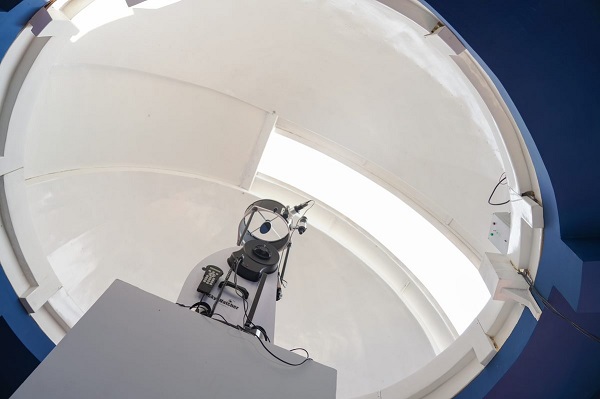Hyderabad, (Samajweekly) A 4m modern astronomical observatory, which is the first in-campus astronomical research facility among all IITs, has been established by the Indian Institute of Technology Hyderabad (IIT-H).
Primarily designed as a frontier research facility in astronomy, the Advanced Darksky Observatory (ADO), with adaptive imaging and multi-filter spectroscopy, will deliver imaging and spectroscopic data banks, which will be valuable assets for research and modern teaching.
Former Chairman of ISRO, K. Radhakrishnan, on Tuesday inaugurated the Advanced Darksky Observatory (ADO) as part of the National Science Day celebrations in the physics department of IIT-H.
Highlighting the importance of such an observatory, Radhakrishnan said, “It is a wonderful robotic telescope that you have built here. If all engineering science capabilities of this institute are put together to build a new breed of instrumentation for space exploration, you will be a major contributor.”
ADO will host a 0.5 metre robotic optical telescope (largest among small telescope categories) which will have a magnification of ~1000x, capabilities of resolving a structure as small as 25 km on the surface of the moon, individual rings of Saturn, detecting active galaxies up to a distance of 1.5 Giga light-years (1,419 billion kilometres).
Due to its upcoming full robotic capabilities, the observatory will be capable of integrating into the global telescope network system like NASA’s Global Telescope Network (GTN) for urgent alerts to the scientific communities on transient celestial events, asteroids and meteorites. It will also complement ISRO’s current and future space-based astronomical observatories.
B.S. Murty, Director, IIT-H, said, “At IIT-H, we have set up a 14-inch telescope under a special ADO, which can give us a vision of the minor details in space so that one can be able to learn more about them, and ensure that the knowledge about space, in general, get enhanced.”
Apart from leading astronomical and planetary research, the observatory will develop and actively engage in the R&D of advanced imaging equipment.








